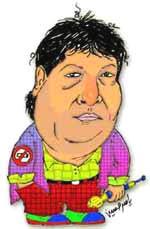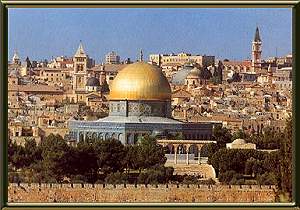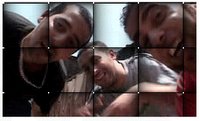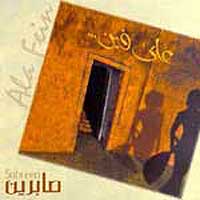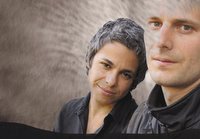
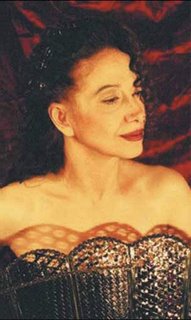
"French-Moroccan singer Sapho thrills audience with her modern rendition of timeless classics"
By Zeina Nasr
Special to The Daily Star
Thursday, November 02, 2006
Review
BEIRUT: Photographers hover around a slight woman, their cameras busily clicking and flashing. She wears a sleeveless black top and a long, sparkling silver skirt. A diaphanous white shawl is draped over her shoulders. Her thick curls surround a pale visage with dark eyes and fine features. Her lips are painted a deep red. She obliges the press with a sunny smile, playing the part of agreeable celebrity. Agreeable she is - sincere, warm and infectiously exuberant.
The French-Moroccan singer Sapho's two-night run at the French Cultural Center encapsulates Lebanon's recovery, marking one of the first international performances to be held in Beirut since the end of this summer's war. Prior to her first concert Tuesday night, she explained she had always wanted to perform in Lebanon but hesitated when people had told her the country hadn't become safe enough to receive her. Yet here she is, in the wake of Lebanon's least safe season in years.
Lebanon is "a country of conflict but also a country of encounters and of alterity," says Sapho, who harbors a lifelong attraction to cultures of clashing multiplicity. She says she came to Lebanon now both despite and because of the recent war. She wanted to make a statement of support and a gesture of understanding; she did not seek to simply distract a traumatized population with her music. After all, she is implicated by personal and artistic experience in the region's tumultuous history.
A Moroccan Jew born in Marrakesh, Sapho moved to France with her family when she was a teenager. After studying theater and music, busking on the cafe terraces of Saint-Germain-des-Pres and experimenting with numerous alter egos, she eventually adopted the stage name Sapho after the ancient Greek poetess. In the years that followed, she landed several record deals and performed in a dizzying variety of musical genres from American rock to flamenco and spoken word.
In 1992, she undertook Umm Kulthum's epic "Al-Atlal." Under the guidance of Lebanese orchestra conductor Elie Ashkar, Sapho managed to produce a critically acclaimed interpretation of the legendary song. "Al-Atlal" served as a defining moment, shifting Sapho's music toward an eclectic sound driven by Arabic and Andalusian influences. As she is fond of asserting, "I consider myself a citizen of the world and a singer of the world."
Sapho admits that despite an intellectual mastery of French, her singing voice moves more readily in Arabic - not classical Arabic but colloquial Moroccan, she explains, the language of her childhood and the language of the street, which melds her music into her political life. To sing in colloquial Arabic is to sing with the voice of the people.
Such a stance is not a matter of political ideology for Sapho but rather a means to convey honest and immediate experience. The political positions she takes, Sapho explains, embody her personal attempts to embrace her own culture: "We are, after all, simply subjects trapped in bodies, and our art is but a memoir of our experience."
In 1994, Sapho performed "Al-Atlal" to an audience of Israelis in Jerusalem. Four years later, she performed a seminal concert in Gaza. "Art is dangerous!" she exclaims, "whether one is politically engaged or not. To be an artist and a poet is to subvert language and to subvert meaning - to be subversive!"
Sapho's latest act of subversion involves setting Leo Ferre's classic songs to the flamenco guitar of Vicente Almaraz. First performed in the fall of 2005, the Ferre a la flamenco project continues to attract and charm audiences, having received abundant critical praise in France.
This is the repertoire Sapho brought to Beirut, aware that a Lebanese audience may feel the same formative love for Ferre as she does, having grown up with his erudite love songs, anti-war anthems and odes to anarchy.
"Ferre turned esoteric and inaccessible French poems into beautiful and popular music," she explains, and it is to this populist spirit of cultural engagement she pays homage.
The first of Sapho's two concerts opens with Almaraz's solo guitar. He has arranged the music in collaboration with Sapho, and it's clear from the inaugural melody that a distinctly Andalusian sound will characterize what follows.
Sapho appears on stage and slowly adjusts her shawl, leaning her torso forward to sing the opening lines of "Il N'Aurait Fallu" - a song set to a poem by Louis Aragon.
The words arise from her body like primal sounds that flirt with melody. She moves in and out of lyricism, lacing her notes with scratchy grit, bending her words to the stilted beats of speech. Her voice is at once grating and soothing, harshly guttural in its attacks and resonantly fluid in its releases. As the song unfolds, it is clear that she has succeeded in mastering Ferre's approach while preserving the recitative rhythms and poetic expression of Aragon's verse.
As she moves through a careful selection of Ferre's vast catalogue, singing favorites like "Est-Ce Ainsi Que les Hommes Vivent," "Monsieur William," "Avec le Temps" and "Comme a Ostende," Sapho proves herself as not only a singer with a striking voice, but also as a sensually theatrical and deftly charming stage presence.
"Isn't it strange," she quips, "that all these sad songs and depressed poets bring us nothing but happiness?"
As her final song comes to an end, the crowd asks for more, and Sapho impishly expresses her relief at being asked for an encore. The night's surprise guest, oud virtuoso Charbel Rouhana, waits in the wings. What comes next is the climax of the performance: a rendition of "Avec le Temps" sung in colloquial Moroccan followed by an excerpt from "Al-Atlal."
The crowd at the French Cultural Center is astounded. For those who know and love Umm Kulthum, Sapho's rendition is uncanny. For those who are not ardent fans of the original, Sapho's more accessibly modern approach is a revelation. The cante jondo ("deep song") of flamenco meets the soaring melisma of tarab and the results are nothing short of a fertile musical evolution.

